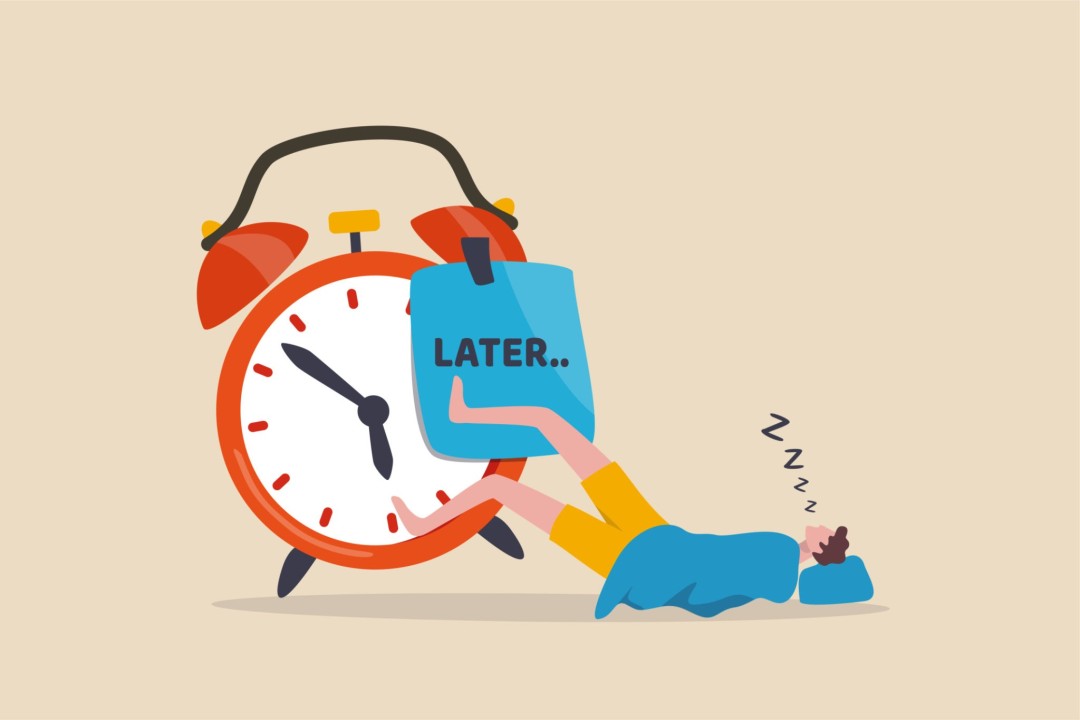Career Tips
How To Stop Procrastination And Boost Productivity

Do you frequently procrastinate or postpone chores, leaving them unfinished until the final hour? If you answered yes, you have a procrastination habit and must learn how to overcome it.
Procrastination is the practice of delaying or postponing things till the final hour. Procrastination is the inability to do or finish tasks, even when you want to.
It isn’t only you. According to a recent research, around 20% of adults today identify as chronic procrastinators. In this article, we will explain how to overcome procrastination and increase productivity.
Why Do You Procrastinate?
There might be numerous reasons for procrastination. These factors differ depending on the person and the type of labor required. Some of the reasons you procrastinate may include:
- Inadequate reward for work
- The complexity of the task
- Non-availability of resources
- Long and stressful work environment
- Boring or monotonous work
- Unorganized workspace of an unorganized way of living
- Distractions such as social media, gossip news
- Poor concentration
Types of Procrastination
There are mainly three types of procrastination:
- Classic procrastination
This sort of procrastination occurs when you delay or postpone duties despite knowing that you must accomplish them within a specific time frame. This leads to last-minute rushes, an accumulation of pending work, and missed deadlines.
- Creative procrastination
It indicates that you are focusing on less critical duties. It is participating in some activity that makes you feel busy and productive, but you keep putting off the work that you should be performing.
- Priority dilution
This sort of procrastination entails taking on chores without prioritizing them. It is equivalent to practicing chapters with lower weightages in tests twice and not reading the chapters with higher weightages at all.
Procrastinators Vs Non-Procrastinators
The amount of contentment and achievement in their lives distinguishes procrastinators from non-procrastinators. The following are the primary contrasts between procrastinators and doers:
| Procrastinator | Non-procrastinator |
| 1 Worried about the outcome of the task | 1 Believes in completing the task without worrying about the output. |
| 2 Overthink and overprepare before initiating work. | 2 Initiates work with adequate planning but does not delay it with overpreparation in want of perfection. |
| 3 Take the burden of their work. | 3 Finds fun and enjoys doing their work. |
| 4 Struggle to achieve a mediocre level of success. | 4 Goal achievers and outperformers. |
| 5 Take up multiple tasks together and end up with a lack of concentration and pending work. | 5 Act realistically and complete tasks one by one with full focus |
How To Overcome Procrastination in 9 Steps
If you want to increase your productivity and meet your deadlines, you must overcome your procrastinating habits. Here are several approaches of overcoming procrastination:
- Recognize That You are Procrastinating
If you understand the necessity of finishing a task and have the necessary resources, but you continue to postpone it, you are undoubtedly procrastinating. Recognizing this is the initial step.
- Figure Out Why You are Procrastinating
The task you have to accomplish may be boring, demanding, unpleasant, or unsatisfying. There could be other similar explanations. Identifying the causes of procrastination can help you devise strategies for overcoming it.
- Adopt Anti-Procrastination Strategies
Now that you understand your problem and the causes for it, you should work to solve it. Adopt anti-procrastination tactics such as avoiding overthinking, not focusing on the end result, making your job enjoyable and fascinating, sticking to a healthy routine, working in tiny chunks, and taking breaks between tasks.
- Schedule Your Work Consistently
The greatest technique to avoid procrastination is to create a calendar or to-do list for your work responsibilities. Scheduling your job provides your brain with a defined mind map that allows it to perform continually. It motivates you to take action and complete the work on time.
- Create A System for Starting New Tasks
The hardest part for procrastinators is getting started. A good start can lead to effective and timely completion of the work. As a result, before beginning a new task, you should conduct good planning, gather all necessary resources, create a timeline of activities to be followed to complete the work, and then take action to launch a new task.
- Disentangle Your Feeling
Feelings of frustration and aggravation cause procrastination, and vice versa. To eliminate procrastination, you must first separate your feelings and stop the vicious spiral.
- Use Self-Compassion to Overcome Strong Negative Memories
Unpleasant recollections from the past, such as bad feedback for work, insufficient remuneration, or failure, may cause you to procrastinate on your work. If this is the situation for you, you should utilize self-compassion to cope with your negative memories and overcome the need to procrastinate.
- Reverse Brainstorming
Reverse brainstorming entails considering how a problem could deteriorate and then taking the opposite approach to address it. Consider how you can exacerbate this problem, such as quitting working altogether, neglecting deadlines, stacking up pending projects, and so on, and then think and act in the other direction to overcome procrastination.
- Learn to Accept Friction-Filled Work
You should not anticipate your job life to be easy and problem-free. Accept difficult and complex work as a challenge, rather than a burden.
Scientific Ways to Stop Procrastination
You can retrain your brain to get back on track by implementing proven methods to stop procrastinating. Here are some scientific methods to prevent procrastination:
- Set Daily Targets
Every morning, make a to-do list. Try to finish your assignments within the time limit. Setting goals motivates your brain to work and prevents procrastination.
- Take Moments of Self-Realizations
Self-realization is the most effective technique to create or stop a habit. To overcome procrastination, assess what you have missed or may miss in the future as a result of procrastination. It will motivate your mind to fight back and get back to work.
- Avoid Distractions
Distractions such as unwanted phone calls, social media, and noises might disrupt your rhythm. If you indulge in such hobbies, your brain loses attention, and you begin to procrastinate on your main objective.
- Add Fun to Your Tasks
Boredom and monotony can cause procrastination. To avoid boredom, take a few fun breaks and engage in engaging activities in between duties.
- Prioritize Your Tasks
Maintain a priority-based task chronology. It will direct your brain to select tasks one at a time, without procrastination. When you see a list of chores that you have finished, you will be driven to continue working without delay.
How To Overcome Procrastination As A Student?
Procrastination is one of the most common challenges students experience. If you are a student who struggles with missed deadlines and low productivity, here are some methods to fight procrastination as a student:
- Stop Thinking and Start Immediately
The greatest technique for kids to overcome procrastination is to stop thinking and act. Thinking about your situation without taking action will get you nowhere.
- Follow the Pomodoro Technique
This strategy has proven to be quite beneficial for students who procrastinate. The prospect of protracted study sessions worries every student and is a major source of procrastination. According to the Pomodoro approach, you only study for 25 minutes and then take a 5-minute break. Then, after twenty-five minutes, resume your studies and take another five-minute rest.
After completing three 25-minute periods, you can take a 30-minute rest. Small study sessions will help you overcome your phobia of long hours and procrastination.
- Reward Yourself
After you’ve met each goal, reward yourself with something you enjoy. For example, you could eat your favorite chocolate, listen to music, talk to a friend, or do something else enjoyable and intriguing. This will motivate you to complete the activity with determination, rather than becoming bored.
- Communicate Your Goals
If you are one of those students who sets goals every day but then postpones them for no apparent reason, you should try this. Discuss your daily goals with your friends, parents, or teachers. This will instill a sense of accountability in you, and you will strive to achieve your goals without resorting to procrastination.
How to Overcome Procrastination in Daily Life
Procrastination and sloth go hand in hand. You are indolent and tend to postpone your work. If you procrastinate because you are lazy, you must overcome your laziness. Here are a few tips for overcoming procrastination in your daily life.
- Maintain A Healthy Lifestyle
Some factors that contribute to laziness include an unhealthy lifestyle, poor sleep quality, a disrupted schedule, and eating unhealthy foods. With a lethargic and lazy mind, you are more prone to postpone on duties for no reason. To combat procrastination and laziness, you must establish a good routine and lead a healthy lifestyle.
- Refrain from Overburdening Yourself
You should not try to work beyond your capacity. If you take on several jobs and are unable to do them on time, you are likely to become demotivated. To avoid this, understand that you cannot work beyond your limits.
- Stay Organized
You will be able to perform your chores more efficiently if you maintain your workspace or study area organized. An untidy and cluttered environment may impede you from starting your tasks.
- Maintain Continuity of Work
Working for short periods of time and taking extended breaks can disrupt your work rhythm. It may overburden you with incomplete chores. It is preferable to take small pauses while working and keep consistency to avoid laziness and procrastination.
Drink enough water to keep your mind active. Taking a few sips of water at small intervals might keep your mind busy. Proper hydration can help you beat laziness and procrastination.
Turning Procrastination into Productivity
Overpreparation for perfection without taking action might result in procrastination. As a result, it is critical to take action rather than continue to contemplate and prepare. Taking the initial step and beginning your task is one of the most effective ways to combat procrastination strategies.
When you recognize you are ready to fall into the trap of procrastination, you should quickly start a task and try to complete it. A single accomplishment can serve as fuel to propel you forward, help you overcome procrastination, and increase your productivity.
FAQs
What are 3 solutions to procrastination?
To overcome procrastination, try these three strategies:
- Break tasks into smaller, manageable steps. This makes you feel less overwhelmed and makes the work seem less daunting.
- Set clear and realistic deadlines to create a sense of urgency and accountability.
- Use positive reinforcement, such as rewarding yourself after completing a task, to stay motivated and reinforce productive behavior.
Why am I procrastinating so much?
There could be various reasons why you procrastinate. It could be due to fear of failure or perfectionism, feeling overwhelmed by the activity, a lack of enthusiasm or interest, or a long-standing habit. Understanding and treating the root reasons of procrastination, as well as employing good time management skills, will help you overcome it.
What is the 2-minute rule of procrastination?
The 2-minute rule is a tactic for overcoming procrastination. It says that if a task takes less than two minutes to perform, you should do it right away rather than postponing it. By taking prompt action on little jobs, you avoid them accumulating and gain momentum for larger projects. This guideline assists in overcoming initial reluctance and getting started.
Is laziness and procrastination the same thing?
Laziness and procrastination are not synonymous, though they may be related. Procrastination is defined as delaying or postponing work, whereas laziness denotes a general lack of drive or willingness to participate in activities. Procrastination can be caused by a variety of circumstances, whereas laziness is characterized by a persistent attitude against exerting effort.












